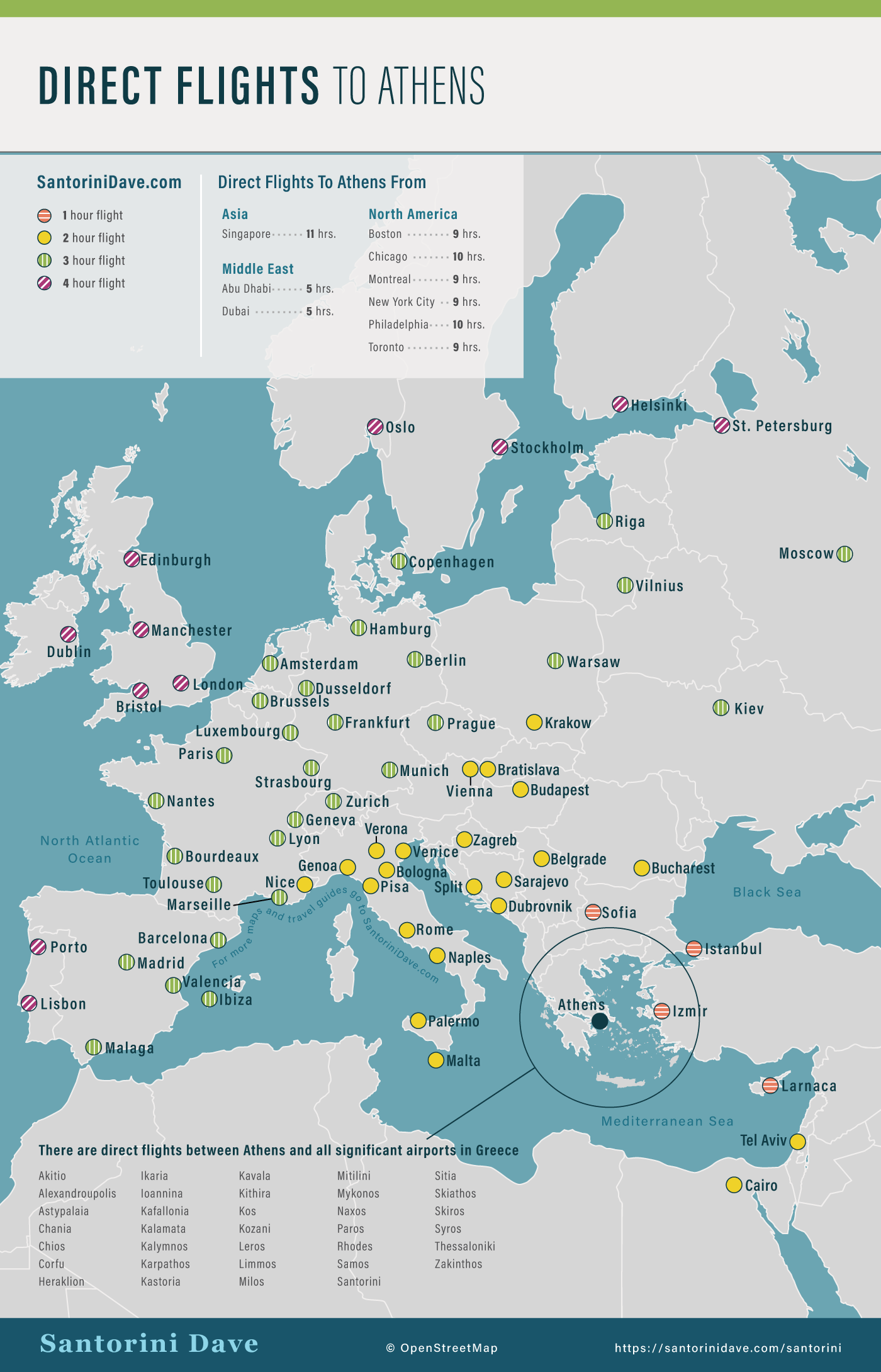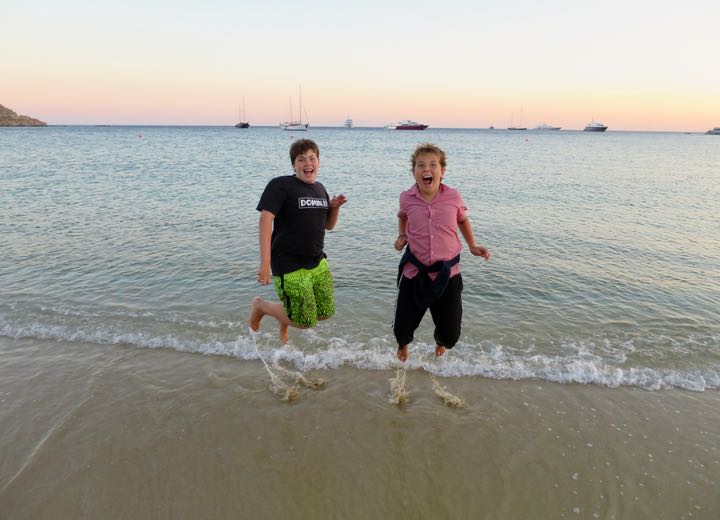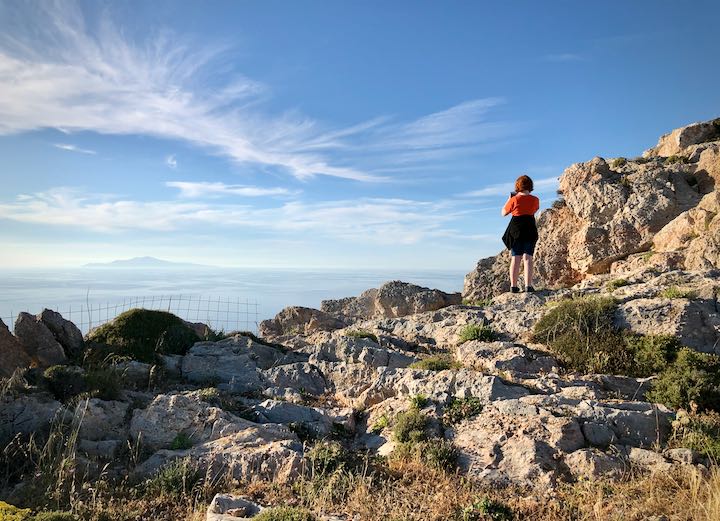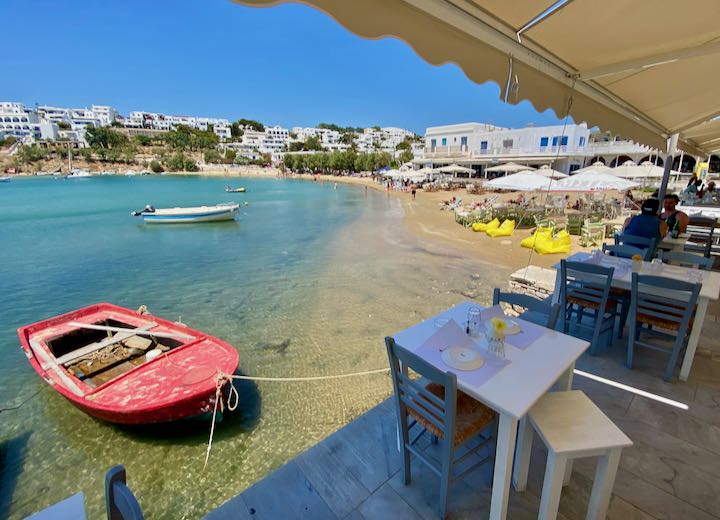Greece › Family Holidays
By Santorini Dave
See Also
- Athens – Where to Stay & Go
- Santorini – Where to Stay & Go
- Mykonos – Where to Stay & Go
- Naxos – Where to Stay & Go
- Paros – Where to Stay & Go
- Crete – Where to Stay & Go

My boys on a boat in the Santorini caldera. A boat tour of the caldera is one of the highlights of a family trip to Greece.
My Advice – 10 Things to Know for Planning a Greek Holiday
1. Greece is a Wonderful Destination for a Family Holiday
Greece and the Greek Islands are my favorite place in Europe for a family vacation. Great beaches, interesting history, incredible food (much of it kid-friendly), wonderful people. Island hopping by ferry adds a bit of adventure to the whole thing and an opportunity to see several very distinct destinations. There are no extra vaccinations required, and no special medicine prescribed. Transport in Greece, whether by Greek ferry, bus, or plane, is efficient and comfortable.
2. My Family’s Favorite Islands
My favorite places in Greece for my family are the Greek Islands, and my favorite island for families is Naxos. But there are many others that are also kid-friendly and great for families. Mykonos, Crete, Rhodes, and Corfu are four more that have great beaches, cool towns, and a family-friendly atmosphere. Santorini is typically thought of as a couples’ destination but there’s a lot to see and do and it’s still a great family destination (especially if your kids are a little older, say, 6 and up).
3. Greece is Easy to Get to from the U.K. and North America
Santorini, Mykonos, Crete, Corfu, Rhodes, and Kos have direct flights from London, Manchester, Paris, Amsterdam, and Rome, making trips to the islands quick and easy. It is common to be sitting on a beach within 4 to 5 hours of taking off from a European hub.
Getting to the Greek Islands from the U.S. or Canada requires two flights. You will either connect in a major Western European hub (like London or Paris) or fly directly to Athens and then take a short domestic flight or ferry. For 2026, direct flights to Athens are available from New York (JFK and Newark), Chicago, Atlanta, Boston, Philadelphia, Washington D.C., Montreal, and Toronto. No North American airlines fly direct to the islands; you must transit through Athens or Europe.
My kids on the wonderful beaches of Mykonos. Mykonos has a reputation as a party island (and there’s some truth to that) but the club scene is easy to avoid if you’re with kids.
4. Best Time to Visit Greece for a Family Holiday
The best weather for a family holiday in Greece is from late May to late September. This is the prime window for blue skies and warm swimming temperatures. For the absolute best beach weather, visit between late June and mid September when the sea is at its warmest and rain is rare.
5. The Highlights of Athens Can be Seen in One Full Day of Sightseeing
The top attractions in Athens (Acropolis, Acropolis Museum, and historical sites in the Plaka) can be easily seen in one full (but busy) day. Take two days if you want a slower pace. Book a ferry for the following morning (most departures for the islands are between 7:00 and 8:00) to get the kids to the beach by lunchtime.
6. The Best Greek Islands for History and Culture are Crete, Rhodes, Santorini, and Delos
Crete has the single best historical site on any of the Greek Islands: Knossos near Heraklio. Rhodes has the Medieval City of Rhodes Town and the Acropolis of Lindos. And Santorini has the caldera, the volcano, and the story of how this island was destroyed by an immense volcanic eruption. The entire small island of Delos is a UNESCO World Heritage Site full of incredible ruins; you can’t stay there, but it is easily reached from Mykonos.
7. The Best Beaches for Kids in Greece
The single best beach in Greece is Elafonisi Beach in Crete. It features a shallow lagoon with pink sand and crystal-clear water, perfect for toddlers. Other top family beaches for 2026 include Agios Georgios and Plaka in Naxos (the shallowest and easiest for kids), Golden Beach in Paros, and Tsambika in Rhodes. In the Sporades, Koukounaries in Skiathos is excellent for its calm water and pine-shaded shores.
Santorini has unique volcanic beaches, but they are generally not kid-friendly. The black sand and pebbles get scorching in the midday sun, and the water drops off deep very quickly. If you are in Santorini with small children and want a beach day, Monolithos Beach is your best bet; it is the only one on the island with fine sand and a long, shallow entry. Otherwise, Perissa is the best of the organized black sand beaches because it has wide wooden walkways to protect your feet from the heat.
8. Greek Restaurants are Very Kid Friendly
Almost all Greek restaurants and tavernas have a family-friendly atmosphere where kids are welcomed and pampered. Santorini and Mykonos (known for luxury and nightlife) each have a handful of restaurants where kids might be a little out of place but these are the exceptions and the majority of restaurants on every Greek island will welcome your kids with open arms (literally).
9. Do a Tour
Greek tour guides are great. (It’s a national law that tour guides need to have a degree in Greek history to conduct any tour to a historical sites in Greece.) And you’ll get much more out of any visit to a historical attraction if you get a guide. At some sights (e.g. Knossos) it’s easy to walk up and find a good guide. At other sights (Akrotiri in Santorini) it’s best to book in advance. Doing a food tour is also highly recommended (especially in Athens).
10. Best Websites for Planning a Greek Holiday
Planning a Greek holiday is easy to do by yourself. Don’t book a package holiday as you end up getting second-rate hotels and the worst flights. These are the websites I use and recommend for easy and reliable trip planning:
- Google Flights to find the best airfares and connections.
- Booking.com to book hotels.
- FerryHopper.com to find ferry schedules and book tickets.
- Welcome Pickups for port/airport transportation.
- Booking.com for reserving rental cars.
- GetYourGuide.com to find and book sightseeing tours.
Special Considerations for Family Travel in Greece
- Perhaps the most challenging aspect for families is finding hotel rooms suitable for 4, 5, 6 or more people. The most common hotel room is small with 2 single beds with a small balcony and usually a small fridge. Many options do exist outside of these, but it will require some planning and booking in advance.
- Standard Greek taxis have a strict 4-passenger limit. For families of 5 or more, you must book a private van transfer through Welcome Pickups or your hotel, or use Uber where available, as hailing a large vehicle on the street is nearly impossible.
- High chairs are rarely found in restaurants which can make a stroller an appealing option as a place to sit a baby or small toddler during meal time.
What are the Best Greek Islands for a family holiday?
Folegandros is a great island for families interested in solitude, quiet, and good hiking.
The 7 Best Greek Islands for Families:
Crete •
Rhodes •
Paros •
Naxos •
Santorini •
Mykonos •
Corfu
- Best Greek Island for Families: Naxos (Best overall balance of beach, food, and ease of travel).
- Best Greek Island for Beaches: Naxos, Mykonos, Ios, and Crete (Elafonisi and Falassarna).
- Best Greek Island for Teens: Santorini, Mykonos, Paros, and Naxos (for water sports).
- Best Greek Island for History: Crete (Knossos), Rhodes (Old Town), Santorini (Akrotiri), and Mykonos (as a base for Delos).
- Best Greek Island for Hiking: Crete, Folegandros, Santorini, and Naxos.
- Best Greek Island for Biking: Kos (The most bike-friendly island in Greece).
- Best Greek Island for Luxury: Santorini and Mykonos.
- Best Greek Island for Quiet and Solitude: Folegandros, Ikaria, and Karpathos.
- Best Greek Island for Outdoor Activity: Crete and Santorini.
- Best Greek Island for Food: Crete and Naxos (both have incredible local agriculture).
- Best Greek Island for Family Cruise: None. Skip the cruises; you will see much more by staying on the islands.
- Best for Island Hopping: Santorini, Naxos, Paros, Ios, Mykonos, and Milos are excellently connected.
How far in advance should I book hotels?
Paros is a wonderful mix of charming towns and idyllic beaches. For the best choice in family rooms, book early – especially for popular destinations like Mykonos, Santorini, Naxos, and Paros.
- For July and August on the most popular islands – like Santorini and Mykonos – booking early is absolutely essential. This is especially true for families. While a couple might find a last-minute room, suites that accommodate four or more people are the first to sell out. For peak summer 2026, I recommend booking these at least 6 to 9 months in advance.
- For 2026, early booking trends are surging. Islands like Paros and Kos are seeing large increases in pre-bookings compared to previous years. If you are targeting these islands for a summer family holiday, 6 months in advance is now the bare minimum; for specific high-demand villas or beachfront suites, 10 months in advance is safer.
- Booking.com is my favorite tool for Greece. It is reliable, well-organized, and offers generous cancellation plans that allow you to lock in a price and a family room while keeping your plans flexible. Many travelers use this to secure “early bird” rates while they finalize their ferry routes.
- Flexibility is great in theory, but for families, it can be a gamble. In June or September, you might find walk-up availability on islands like Naxos or Paros, but you will likely end up far from the beach or the main town. If you want a specific location or a pool, book ahead.
- If you do arrive without a reservation, you will often see hotel owners meeting the ferries with signs and photos of their rooms. These are typically budget-friendly, family-run guesthouses. If they say the hotel is “in town,” ask them to show you the exact location on Google Maps before getting into their van.
When is the best time to visit Greece for a family vacation?
Waterfront dining in Naxos is a highlight for families. The prime months for Greek island weather are June through September.
June and September are the best months for a family vacation in Greece, with July and August following closely behind. If you want the absolute “sweet spot” for 2026, aim for mid-September. The air temperature is warm but not stifling, the crowds have thinned out, and the sea temperature is at its warmest. While the water can still be a bit brisk in early June, by September it has been baked by the summer sun and is perfect for kids to swim in all day.
Peak Season (July and August): The islands are at their busiest from late June through the end of August. During this time, the weather is hot, the ferries are full, and the beaches are packed. While the “difficulty” of peak season is sometimes exaggerated, you must book your 2026 hotel rooms and ferry tickets well in advance to get your first choices.
Shoulder Season (May and October): These are beautiful months to visit, but they are a gamble if your primary goal is swimming. The weather is usually sunny, but you may encounter a few rainy days or cooler evenings. If your family is more interested in hiking, biking, and exploring historical sites like the Acropolis or Knossos, then mid-April to late May and late September to late October are fantastic, affordable options.
My Advice: If you are tied to a school schedule, go as early in June as possible or as late in August as you can. If you have flexibility, September is unbeatable.
How do I get to the Greek Islands?

These are the 4 easiest and most common ways to get to the Greek Islands:
- Fly to Athens and then ferry to the islands. This is the classic Greek vacation route. Pros: It allows you to spend 1 or 2 days touring the Acropolis and Plaka before heading to the sea. The ferry ride from Piraeus to the Cyclades is iconic and often magical. Cons: It adds transit time. Ferry schedules can be erratic in August due to the Meltemi (strong northern winds). This most often affects smaller high-speed catamarans; larger conventional ferries (like Blue Star) are much more reliable. Cancellations are rare but can happen, so always give yourself a buffer day before your flight home.
- Fly directly to a Greek Island from Europe. Major hubs like London, Paris, Amsterdam, Berlin, and Rome have direct flights to several islands. Pros: It is often very cheap via budget airlines like EasyJet, Ryanair, or Volotea. If you are coming from North America, you can stop over in a city like London for a few days first. Cons: If you are connecting on the same day, be careful. Budget carriers often use different airports (e.g., you land at Heathrow but your flight to Crete leaves from Gatwick). Also, only specific islands have international airports, including Santorini, Mykonos, Crete (Chania and Heraklion), Corfu, Rhodes, Kos, Samos, Skiathos, and Zakynthos.
- Fly to Athens, then fly to the islands. Pros: This is the fastest way to reach the islands. It also allows you to reach smaller islands that don’t have international flights, such as Naxos, Paros, Milos, and Karpathos. Cons: You miss the experience of arriving by sea. In high season, the small planes used by Aegean/Olympic and Sky Express sell out months in advance. If you choose this, book your domestic flight as soon as your international flight is confirmed.
- Combine Greece with Turkey or Italy. Turkey: Daily ferries connect the Greek islands with the Turkish coast. Popular routes include Rhodes to Marmaris, Kos to Bodrum, Samos to Kusadasi, and Chios to Cesme. These are short (1–2 hour) trips. Italy: Overnight ferries run from Ancona, Venice, Bari, and Brindisi to the Greek ports of Igoumenitsa and Patras (often stopping at Corfu). This is a great way to travel if you have a car or want to see both countries in one trip. Book a cabin well in advance for the 8–12 hour journey.
How to Travel with Kids on Greek Ferries
Overnight ferries are a great way to travel long distances and not waste a day of sightseeing, and the cost of a cabin is similar to that of a hotel. Plus, you get to sleep on a bunk bed in a boat! How cool is that?
Ferries are one of the ingredients of what makes a trip to Greece so magical and unique. Ferry hopping around the islands – especially the Cyclades where the islands are very close to each other – is a ton of fun. And if you’re just going from one island to the next it’s very easy too.
Foot passengers usually don’t need to book far in advance – especially for ferries between islands – just buy a ticket from a local agent the day before travel and hop on board. But for ferries from Piraeus (the port near Athens) to an island during high season, it’s recommended to book at least a week prior to your departure. Ferryhopper.com is the best website for searching ferry routes and booking tickets in advance
Most Greek ferry companies (especially Blue Star and SeaJets) now use digital boarding passes. You no longer need to find a physical ticket office at the port if you book via Ferryhopper; just show the QR code on your phone.
When you start doing more than a walk-on ferry ride from, say, Santorini to Mykonos, it gets more difficult. Here are some choices you may need to make for longer ferry rides:
- Do I want to take a high-speed ferry, a catamaran, or a conventional ferry? If you want to take a high-speed ferry or catamaran to or from Athens then you’ll want to book about a week in advance.
- Do I want deck seating (also called 2nd class or airplane-style seating) or do I want to reserve a sleeping cabin? If you want a cabin you’ll want to book at least a few weeks in advance.
- Do I need to take a vehicle on board? If so, booking several weeks in advance is recommended as spots in the car garage are in short supply.
Planning a Greek Island Trip
- Island hopping is what it’s all about. There are so many great islands in Greece it is almost mandatory to visit more than one. With the exception of Crete (see below), don’t limit yourself to one island. However, avoid “island fatigue” by staying at least 3 or 4 nights on each. Two nights is the absolute minimum, but you will spend half that time in transit.
- Crete is a big island and requires at least a week to see well. If you are on a tight schedule and want to see several islands, Crete might not be your best choice. It takes hours to drive from one end to the other. That said, if you have 10+ days, combining Crete with Santorini (a 2-hour high-speed ferry ride from Heraklion) is one of the best family itineraries available.
- Hotels and restaurants on most islands close during winter. Most island businesses shut down by mid-November and reopen in late March or April. Popular islands like Santorini and Crete have year-round residents and always have some options open, but smaller islands like Folegandros or Sifnos can be completely “closed” until mid-May.
- Depart and arrive from different cities (Open-Jaw). Do not fly in and out of Athens if you can avoid it. It is a waste of time and ferry money to double back. For 2026, I recommend flying into a distant island (like Santorini or Rhodes) and working your way back toward Athens for your flight home.
- Don’t ignore Northern Greece. Thessaloniki and Halkidiki offer incredible beaches and a more local feel than the southern islands. If you want fewer crowds and great food, head north.
- Combine Greece with Italy or Turkey. You can easily take an overnight ferry from Italy (Ancona, Bari, or Brindisi) to Corfu or Patras. To the east, daily ferries connect the Greek islands of Chios, Samos, Kos, and Rhodes with the Turkish coast.
- The winds can be intense in summer. The “Meltemi” winds blow from the north in July and August, particularly in the Cyclades. If you are sensitive to wind or traveling with small kids, look for hotels on the south coast of the islands (like the southwest coast of Naxos) where the beaches are protected and the water is calmer.
- Be aware of different spellings. Place names often vary between English and Greek. Key variations for 2026 travelers: Zakynthos is often Zante; Corfu is Kerkyra; Santorini is Thira; Thessaloniki is Salonika; Chania is Hania; and Heraklion is Iraklio. Piraeus is the main port for Athens.
Suggested Ferry-Hopping Itineraries
1-Week Recommended Itinerary for Greece:
Stick to 2 or 3 islands in the Cyclades to minimize travel time and maximize beach time. For a classic family route, I recommend Naxos (best beaches) and Santorini (best views). If you want a third, add Paros. All three are well-connected by high-speed ferries. Finish your trip with one full day in Athens before flying home.2-Week Itinerary:
Spend your first week in Crete (fly directly into Chania or Heraklion). It is a massive island with enough history and water parks to keep any family busy. Then, take the ferry from Heraklion to Santorini (2 hours) and follow the 1-week Cycladic itinerary above, ending in Athens.1-Month Itinerary:
This is the ultimate Greek experience. Start in the North Aegean by flying to Lesvos or Samos. From Samos, take the Dodekanisos Seaways catamaran south through the Dodecanese, stopping for a few days each in Patmos, Kos, and Rhodes. From Rhodes, fly or take the overnight ferry to Crete, then island hop north through Santorini, Naxos, and Mykonos, finishing your month in Athens.Choosing Ferries and Buying Tickets
- The best website for viewing ferry schedules and buying tickets for Greek ferries is FerryHopper.com.
- Ticket prices on a similar ferry will always be the same between 2 ports (the prices are set by the government) but services, speeds, and amenities can vary greatly between types of ferry and ferry companies.
- Most islands are connected to Athens by at least one ferry a day – even in winter. A subway connects downtown Athens with the port of Piraeus making getting to your ferry cheap and easy, but the port is huge and confusing to figure out for a first timer. Plan to get to the port at least an hour before your ferry departs. There are lots of places to eat and buy snacks in Piraeus before you get on your ferry. A suburban train route connects the airport with the port of Piraeus where the ferries leave for the Greek Islands. If you’re flying to Athens but don’t want to stay there you can almost completely bypass it. (See our Athens Ferry Port Guide for more information.) Most ferries to the islands leave early in the morning so even the best-executed plans will have you staying the night in Athens.
- High speed ferries, catamarans, and Flying Dolphin hydrofoils will cost about twice the price of a conventional car/passenger ferry. (Believe me, if you think keeping all the ferries straight is confusing, I know. I’m very familiar with the different types and I can just barely remember which is which.)
- Generally, the slower the ferry, the more stable the ride. Larger car/passenger ferries will take a lot longer, but they are much more stable than faster ferries on rocky seas.
- Cabins are recommended for long overnight ferries to Crete, Rhodes and other islands far from Piraeus (Athens’ ferry port). You’ll see lots of folks camped out in the hallways and stairwells, or sleeping upright in seats, but everyone does better the next day after a good night’s sleep – and the convenience of a cabin is well worth the price.
- Ferries do not travel between every 2 islands in Greece. Far from it. Ferries tend to move within island groups – between different Cycladic islands for example – with the most popular islands within a group serving as a hub to neighboring island groups. This makes the idea of vacationing in just one island group a good plan to follow unless you have lots of time to spare.
- During high season (June to September) there are departures to all of the most popular islands every day – usually multiple departures. There are far fewer ferries in the winter months, but at all times of the year there will be the following departures:
Morning Ferries
- Piraeus to Syros, Tinos and Mykonos
- Piraeus to Paros, Naxos, los and Santorini
- Piraeus to Kythnos, Serifos, Sifnos and Milos
Evening overnight ferries
- Piraeus to Hania, Crete
- Piraeus to Heraklion, Crete
- Piraeus to Rhodes and neighboring islands
- Piraeus to Lesvos and Chios
What are the Greek Island groups and why do they matter?
One of the many cats of Greece. Milos, like many islands in the Cyclades, has an organization that provides food and medical care to the many feral cats that delight kid and adult visitors alike.
The Greek Islands are divided into several island groups. In part for administrative reasons, but more commonly for shared history and island geography. Ferries and catamarans run more frequently within island groups than between them, so don’t assume that 2 neighboring islands will have daily ferry connections if they lie in different island groups. The most popular island groups for tourists being:
Saronic Islands – a few hours by ferry from Athens. Most popular islands: Hydra, Aegina, Poros, Spetses.
Cycladic Islands – in the middle of the Aegean Sea, about 4-8 hours from Athens by ferry. Most popular islands: Santorini, Mykonos, Naxos, Paros, Ios, Milos.
Dodecanese Islands – in the southeast of the Aegean Sea, off the southwest coast of Turkey. 10-18 hours by ferry from Athens. Most popular islands: Rhodes, Karpathos, Kos, Patmos.
Aegean Islands – off the central coast of Turkey. 8-15 hours from Athens by ferry. Most popular islands: Samos, Chios, Lesvos.
(Northern) Sporades: – in the northeastern section of the Aegean, closer to Thessaloniki and Istanbul than to Athens, 2-5 hours by ferry from Thessaloniki. Most popular islands: Skiathos, Skopelos, and Skyros.
Crete: – the biggest island in Greece and thus its own island group, 10-15 hours by ferry from Athens. Main Cities: Heraklio, Rethymno, Hania.
Ionian Islands: – the only group on the west side of Greece, 1 or 2 hours by ferry from the western ports of Igoumenitsa and Patras, or overnight ferry from Bari or Brindisi in Italy. Most popular islands: Corfu, Kefalonia and Zante (Zakynthos).






About Santorini Dave